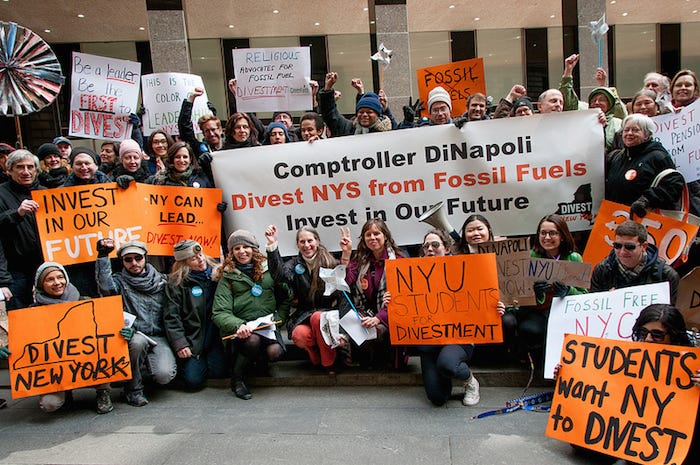The Climate Politics Almanac: State of the State Treasurers, Part One
An overview of nine upcoming races from California to Nebraska.
In 2022, many elections for state treasurer will take place. The U.S. Climate Politics Almanac reviews the office-holders and the upcoming elections for these crucial officials, who oversee trillions of dollars in public investments. States are listed in rough descending order of the size of their investments. Subscribe to get the full series.
California

California’s state treasurer oversees an investment portfolio with $100 billion in assets and serves on the board for CalPERS, the largest public pension fund in the United States. CalPERS has over $27 billion in fossil fuel investments, while CalSTRS (the state teacher pension fund) has over $15 billion. Prior to winning election to her first term in 2018, Treasurer Fiona Ma (D) served on the San Francisco Board of Supervisors and in the California State Assembly, where she was known as an environmental ally, including through her passage of a bill banning toxic chemicals in toys. Ma has supported divestment of state pension funds from fossil fuels. Although the California Democratic Party successfully prevented Ma and other statewide elected Democrats from declaring their candidacy in this year’s failed recall attempt against Governor Gavin Newsom, Ma is one of three statewide public officials who has said she will run to become California’s first woman governor in 2026. Ma does not yet have any declared opposition for re-election in 2022. The top-two primary election will take place on June 7.
Florida
Florida’s Chief Financial Officer (CFO) oversees the state Department of Financial Services, which means the CFO serves as the state insurance commissioner in addition to the usual functions of a state treasurer, including management of a $253 billion investment portfolio. CFO Jimmy Patronis (R) was appointed to his position in 2017 by former governor Rick Scott, and was elected to a full term in his own right by a 51-48% margin in 2018. Patronis regulates insurance and serves as the fire marshal in a state that has faced $230 billion in costs from climate disasters since 1980 (the second highest total for any state), but has said little publicly about climate risk or its costs to Florida’s state coffers. While serving in the Florida House of Representatives from 2006-14, Patronis was the state chair for the American Legislative Exchange Council, the Koch-backed organization which has aggressively pursued model legislation blocking climate action at the state level. Though one of Patronis’ predecessors analyzed Florida’s investments for climate risk, it has been over a decade since such an assessment has occurred. The primary election for the CFO position will take place on August 23.
With over $2 million on hand, Patronis launched his campaign for re-election in May. “I don’t know when the next crisis will come,” Patronis said in a launch ad that highlighted his ability to secure expedited insurance claims payouts from Hurricane Michael. State Sen. Lauren Book was considered likely to be Florida Democrats’ nominee against Patronis, but she decided against running after getting chosen as minority leader, leaving Democrats without a declared candidate thus far.
New York

New York calls its top financial officer the Comptroller, and they manage an investment portfolio of over $258 billion. Comptroller Thomas DiNapoli (D) is in his fourth term, having first won election in 2006. In 2020, after years of resistance, DiNapoli announced plans to divest state funds from fossil fuels by 2040. Despite this and other signs of progress toward divestment in New York, New York State Teachers Retirement System continues to have over $6.5 billion in fossil fuel holdings. While DiNapoli hasn’t totally ruled out running in the crowded governor’s race in 2022, he seems inclined to seek a fifth term.
Wisconsin
Wisconsin’s state treasurer manages a $1.2 billion public lands trust fund, and helps steward the state pension funds, which control hundreds of billions more in investments. Treasurer Sarah Godlewski (D) won this office in November 2018, the same year that she successfully organized the campaign against Question 1, a failed April initiative that sought to eliminate the Treasurer’s office as an independent, elected position. (Question 1 was placed on the ballot by allies of former governor Scott Walker.) Shortly after taking office, Godlewski used her authority as chair of the Board of the Commissioners of Public Lands to overturn a gag order on consideration of climate change by the Board that was imposed by her Republican predecessor. Noting the major economic and financial implications of climate change, Godlewski framed the decision to overturn the gag order as a matter of fiduciary responsibility. Godlewski was also among the treasurers who opposed Lee Raymond’s re-election as a JPMorganChase director.
In April 2021, Godlewski entered the crowded Democratic primary for US Senate against Republican Senator Ron Johnson. As in her 2018 Treasurer campaign, Godlewski is self-funding to a substantial degree and also has support from EMILY’s List, but progressive groups have mostly lined up behind Lieutenant Governor Mandela Barnes, while the Sunrise Movement has endorsed Outagamie County Executive Tom Nelson.
The 2022 election for treasurer will therefore be an open contest. In the August 9 primary, the Democratic candidates are Fitchburg Mayor Aaron Richardson, whose fairly generic platform notes that “the environment is important,” and West Alis Alderman Angelito Tenorio, who works for Wisconsin Conservation Voters, calls climate change “the most pressing issue of our time,” and pledges to make socially responsible investments as treasurer. On the Republican side, the only declared candidate is Ron Johnson staffer Orlando Owens, who notes his support for God, country, family, and guns (in that order), and somehow intends to use the treasurer position to thwart vaccination mandates and the teaching of critical race theory.
Colorado
Colorado’s state treasurer oversees a $49 billion portfolio, and Colorado’s public employee retirement system has over $2 billion in fossil fuel holdings. Treasurer Dave Young (D) was elected to his first term in 2018, winning this office back for Democrats after eight years of a Republican treasurer. Young previously represented district 50 in the Colorado House of Representatives, where he had a climate-friendly voting record, and his wife Mary Young replaced him in that position. Lang Sias, a former state representative with a far less favorable voting record, announced in November that he would run for the Republican nomination to take on Young. The primary election will take place on June 28.
Connecticut
Connecticut’s state treasurer oversees an investment portfolio of roughly $51 billion. A former labor staffer, Hartford City Council President, and public pension fund lawyer, Treasurer Shawn Wooden (D) was elected to his first term in 2018. His predecessor had served as Connecticut’s treasurer for 20 years. In 2020, Wooden was among the treasurers who opposed Lee Raymond’s re-election as a JPMorganChase director. However, Connecticut’s retirement plan recently invested $85 million in a private equity fund that is keeping coal-fired power plants running. In September 2021, Wooden testified about the Fed’s municipal liquidity facility before the House Committee on Financial Services. The primary election will take place on August 9, and so far Wooden has not officially declared for re-election nor does he have any official opposition.
Illinois
Illinois’ treasurer manages an investment portfolio of over $50 billion. Treasurer Mike Frerichs (D) is in his second term. A former Champaign County official and Illinois state senator, Frerichs won his first term by a razor-thin margin in the 2014 election that also saw Illinois elect a Republican governor. Frerichs went on to be re-elected comfortably in 2018. Illinois faces unique fiscal challenges. It was one of only two localities to utilize the Fed’s municipal liquidity facility, and its underfunded pension system was highlighted in a recent report by the Office of Financial Research. Frerichs has launched a sustainable investment initiative that seeks to engage with companies in reducing their climate risk, and highlights “success stories” like polluting utility Southern Company, which agreed to tie its CEO’s pay to achievement of a net zero carbon pledge. Illinois’ state treasurer does not have term limits. Though Frerichs has not yet formally announced whether he’ll run for a third term, he is widely expected to prevail in re-nomination. State Rep. Tom Demmer (R-Dixon) is the only potential Republican candidate known to be considering a run.
Massachusetts
Massachusetts’ treasurer manages an investment portfolio of nearly $96 billion. The commonwealth’s Pension Reserves Investments Trust has over $880 million in fossil fuel holdings. Treasurer Deborah Goldberg (D) is in her second term. Goldberg was among the treasurers who opposed Lee Raymond’s re-election as a JPMorganChase director, and recently announced plans to establish a rule authorizing the pension fund to vote against directors at companies that fail to align their policies with the Paris climate agreement. If Goldberg runs for a third term in 2022, as seems likely, she appears primed to face Republican candidate Ronald Beaty, Jr., a staunch Trump supporter who previously served as a Barnstable County Commissioner.
Nebraska
Nebraska’s state treasurer helps oversee a state investment portfolio of about $32 billion. Treasurer John Murante (R) was elected to his first term in 2018. Murante was one of the signatories of the treasurer letter urging Kerry against climate action. The primary election for this office will take place on May 10, and Murante has no declared opponents yet.
Part two will review nine more state treasurer races, from South Carolina to Kansas.





